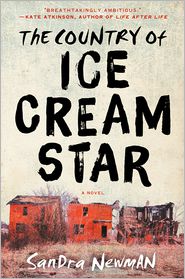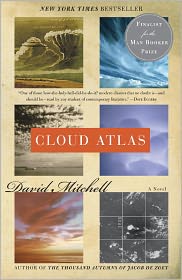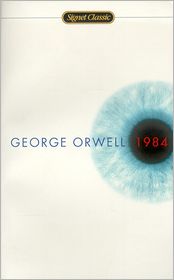New English: 6 SF Novels with Entirely Believable Futurespeak
 One of the most remarkable things about reading is the concept of suspension of disbelief, our willingness to accept crazy stuff on the page despite it being, you know, crazy. But the process isn’t automatic; writers have to work hard to get our disbelief off the ground, and one misstep can bring it crashing down. Which is why it’s amazing, but also understandable, how rarely futuristic SF contemplates how language will change over the next few centuries. Surely if your story is set in the year 10,000, English have mutated a bit? (Or been replaced?) It’s difficult to do, and very difficult to do well, but here are six examples of writers who believably speculated on what the language of the future might be like.
One of the most remarkable things about reading is the concept of suspension of disbelief, our willingness to accept crazy stuff on the page despite it being, you know, crazy. But the process isn’t automatic; writers have to work hard to get our disbelief off the ground, and one misstep can bring it crashing down. Which is why it’s amazing, but also understandable, how rarely futuristic SF contemplates how language will change over the next few centuries. Surely if your story is set in the year 10,000, English have mutated a bit? (Or been replaced?) It’s difficult to do, and very difficult to do well, but here are six examples of writers who believably speculated on what the language of the future might be like.
The Country of Ice Cream Star
The Country of Ice Cream Star
Hardcover $26.99
The Country of Ice Cream Star, by Sandra Newman
Sandra Newman shows us a world in which everyone over the age of 18 inevitably dies of a mysterious illness. When Ice Cream Star’s older brother comes down with the first symptoms, she heads off into the wilderness with a captured guide to seek out rumors of a cure. The story is affecting and well-told, but the truly remarkable achievement of this novel is Newman’s thoroughly believable Future English, rounded down and transformed by apocalypse and isolation—a slang of a possible world that’s poetic and haunting, and yet feels perfectly right for a cast of characters all under the age of 20, and lacking any formal education or similarity with our own experience.
Futurespeak Example: “Can see he known what he will find; he seen this in his hated dreams, these days. And he stand there with his starven looks, the king of these red children. The king of flies and murder.”
The Country of Ice Cream Star, by Sandra Newman
Sandra Newman shows us a world in which everyone over the age of 18 inevitably dies of a mysterious illness. When Ice Cream Star’s older brother comes down with the first symptoms, she heads off into the wilderness with a captured guide to seek out rumors of a cure. The story is affecting and well-told, but the truly remarkable achievement of this novel is Newman’s thoroughly believable Future English, rounded down and transformed by apocalypse and isolation—a slang of a possible world that’s poetic and haunting, and yet feels perfectly right for a cast of characters all under the age of 20, and lacking any formal education or similarity with our own experience.
Futurespeak Example: “Can see he known what he will find; he seen this in his hated dreams, these days. And he stand there with his starven looks, the king of these red children. The king of flies and murder.”
Cloud Atlas
Cloud Atlas
In Stock Online
Paperback $19.00
Cloud Atlas, by David Mitchell
In the far, far future (one of six time periods explored in this complex, intertwined set of stories-as-novel), a group of tribal people on Hawaii known as the Valleysmen speak recognizable English, but mutated into a sort of devolved pidgin, which makes sense when you consider that this portion of the novel is set about a century after a dimly-remembered apocalypse, most likely a nuclear war. The decline has produced a slang-heavy, improvisational language something like a old detective novel read aloud by a crazy person, producing sentences that seem superficially easy to comprehend while actually requiring a bit of a brain rewiring on the part of the reader. It takes some time to get used to it, but once you do, Mitchell’s imagined Futurespeak has an authentic rhythm and patois.
Futurespeak Example: “I cogged for the first time there’n’then. I knowed why I shudn’t kill this Kona.”
Cloud Atlas, by David Mitchell
In the far, far future (one of six time periods explored in this complex, intertwined set of stories-as-novel), a group of tribal people on Hawaii known as the Valleysmen speak recognizable English, but mutated into a sort of devolved pidgin, which makes sense when you consider that this portion of the novel is set about a century after a dimly-remembered apocalypse, most likely a nuclear war. The decline has produced a slang-heavy, improvisational language something like a old detective novel read aloud by a crazy person, producing sentences that seem superficially easy to comprehend while actually requiring a bit of a brain rewiring on the part of the reader. It takes some time to get used to it, but once you do, Mitchell’s imagined Futurespeak has an authentic rhythm and patois.
Futurespeak Example: “I cogged for the first time there’n’then. I knowed why I shudn’t kill this Kona.”
A Clockwork Orange
A Clockwork Orange
Paperback $15.95
A Clockwork Orange, by Anthony Burgess
A Clockwork Orange is perhaps the second most famous novel to wrestles with how people in the future might speak. Every year, at least one college freshman is ill-advisedly inspired to refer to his friends as Droogs, which just underscores the novel’s lasting influence. Inspired in part by Russian, Burgess’ Nadsat slang is initially difficult for anyone who isn’t familiar with that language; it’s presented in the opening sentence and doesn’t let up for a syllable throughout the rest of the book. But the slang is applied consistently, and most readers pick it up within the first dozen pages or so, as the grammatical structure of English isn’t altered much, allowing context to kick in. It remains one of the most memorable and colorful Futurespeak examples in literature.
Futurespeak Example: “There was me, that is Alex, and my three droogs, that is Pete, Georgie, and Dim, and we sat in the Korova Milkbar trying to make up our rassoodocks what to do with the evening.”
A Clockwork Orange, by Anthony Burgess
A Clockwork Orange is perhaps the second most famous novel to wrestles with how people in the future might speak. Every year, at least one college freshman is ill-advisedly inspired to refer to his friends as Droogs, which just underscores the novel’s lasting influence. Inspired in part by Russian, Burgess’ Nadsat slang is initially difficult for anyone who isn’t familiar with that language; it’s presented in the opening sentence and doesn’t let up for a syllable throughout the rest of the book. But the slang is applied consistently, and most readers pick it up within the first dozen pages or so, as the grammatical structure of English isn’t altered much, allowing context to kick in. It remains one of the most memorable and colorful Futurespeak examples in literature.
Futurespeak Example: “There was me, that is Alex, and my three droogs, that is Pete, Georgie, and Dim, and we sat in the Korova Milkbar trying to make up our rassoodocks what to do with the evening.”
1984: 75th Anniversary
1984: 75th Anniversary
By
George Orwell
Introduction
Dolen Perkins-Valdez
Afterword
Sandra Newman
In Stock Online
Paperback $12.00
1984, by George Orwell
Orwell’s classic introduces the concept of Newspeak, which is technically an artificially constrained language rather than a natural evolution of English. Newspeak is designed to constrain not simply language, but thought as well, achieved by the removal of shadings and subtlety, simplifying everything until complex thought is almost impossible, or at least impossible to express—and isn’t that one of the most chilling concepts ever conceived? However, most of the characters think and speak in a more traditional form of English, so we blessedly do not need to become fluent in Newspeak to understand and appreciate the novel.
Futurespeak Example: “Oldthinkers unbellyfeel Ingsoc.”
1984, by George Orwell
Orwell’s classic introduces the concept of Newspeak, which is technically an artificially constrained language rather than a natural evolution of English. Newspeak is designed to constrain not simply language, but thought as well, achieved by the removal of shadings and subtlety, simplifying everything until complex thought is almost impossible, or at least impossible to express—and isn’t that one of the most chilling concepts ever conceived? However, most of the characters think and speak in a more traditional form of English, so we blessedly do not need to become fluent in Newspeak to understand and appreciate the novel.
Futurespeak Example: “Oldthinkers unbellyfeel Ingsoc.”
The Moon Is a Harsh Mistress
The Moon Is a Harsh Mistress
Paperback $16.99
The Moon is a Harsh Mistress, by Robert A. Heinlein
Heinlein’s approach to Futurespeak is logical, and ultimate incredibly successful: his future English is compressed and efficient, with most of the changes in the service of cutting down verbiage and making it easier to get meaning across quickly. This kind of evolution makes a great deal of sense, and is consistent throughout: many prepositions and transition words are simply omitted, and sentences tend to be structured in order to convey concepts without many complex clauses or flourishes. The rend result is initially confusing, then consistently fun to read, and conveys a sense of linguistic evolution without drawing too much attention to itself.
Futurespeak Example: “Maternal grandmother claimed she came up in bride ship—but I’ve seen records; she was Peace Corps enrollee (involuntary), which means what you think: juvenile delinquency female type.”
The Moon is a Harsh Mistress, by Robert A. Heinlein
Heinlein’s approach to Futurespeak is logical, and ultimate incredibly successful: his future English is compressed and efficient, with most of the changes in the service of cutting down verbiage and making it easier to get meaning across quickly. This kind of evolution makes a great deal of sense, and is consistent throughout: many prepositions and transition words are simply omitted, and sentences tend to be structured in order to convey concepts without many complex clauses or flourishes. The rend result is initially confusing, then consistently fun to read, and conveys a sense of linguistic evolution without drawing too much attention to itself.
Futurespeak Example: “Maternal grandmother claimed she came up in bride ship—but I’ve seen records; she was Peace Corps enrollee (involuntary), which means what you think: juvenile delinquency female type.”
Neuromancer
Neuromancer
Paperback $8.99
Neuromancer, by William Gibson
While the technological aspects of Gibson’s 1984 classic have been hit-or-miss (he anticipated the World Wide Web with eerie accuracy a decade before it was even born, but he also imagined a future without smart phones, in which a megabyte of memory would still be expensive and large-scale), but the book deserves credit for introducing many terms that are embedded in language today. In a sense, Gibson did better than create some cool-but-fictional Futurespeak—he actually influenced language in the real world. Gibson coined the term “cyberspace” in an earlier story, but its use in Neuromancer gave it—and others—to the world, a singular achievement for any writer.
Futurespeak Example: “Cyberspace. A consensual hallucination experienced daily by billions of legitimate operators, in every nation, by children being taught mathematical concepts… A graphic representation of data abstracted from banks of every computer in the human system.”
What’s your favorite example of Futurespeak?
Neuromancer, by William Gibson
While the technological aspects of Gibson’s 1984 classic have been hit-or-miss (he anticipated the World Wide Web with eerie accuracy a decade before it was even born, but he also imagined a future without smart phones, in which a megabyte of memory would still be expensive and large-scale), but the book deserves credit for introducing many terms that are embedded in language today. In a sense, Gibson did better than create some cool-but-fictional Futurespeak—he actually influenced language in the real world. Gibson coined the term “cyberspace” in an earlier story, but its use in Neuromancer gave it—and others—to the world, a singular achievement for any writer.
Futurespeak Example: “Cyberspace. A consensual hallucination experienced daily by billions of legitimate operators, in every nation, by children being taught mathematical concepts… A graphic representation of data abstracted from banks of every computer in the human system.”
What’s your favorite example of Futurespeak?





